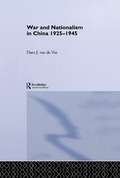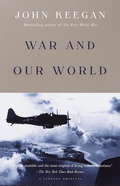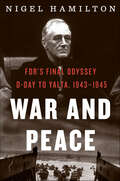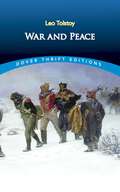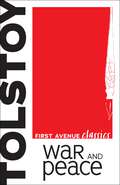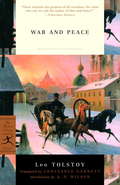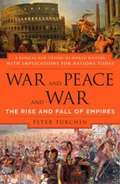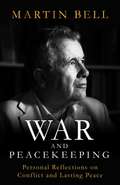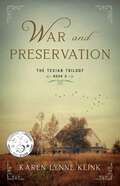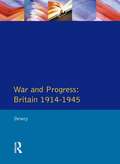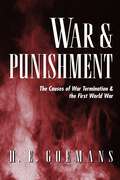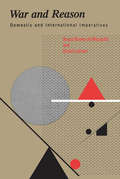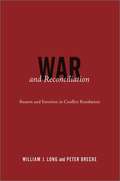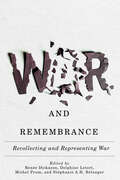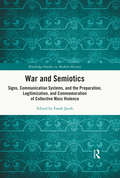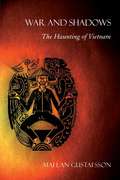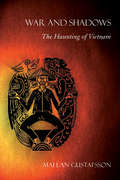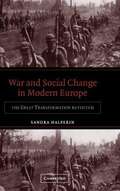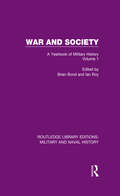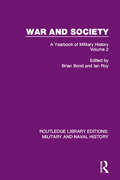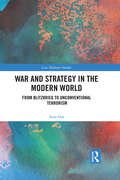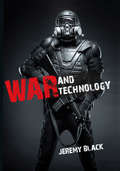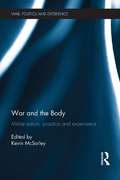- Table View
- List View
War and Nationalism in China: 1925-1945 (Routledge Studies in the Modern History of Asia)
by Hans van de VenIn 1937, the Nationalists under Chiang Kaishek were leading the Chinese war effort against Japan and were lauded in the West for their efforts to transform China into an independent and modern nation; yet this image was quickly tarnished. The Nationalists were soon denounced as militarily incompetent, corrupt, and antidemocratic and Chiang Kaishek, the same. In this book, van de Ven investigates the myths and truths of Nationalist resistance including issues such as: the role of the US in East Asia during the Second World War the achievements of Chiang Kaishek as Nationalist leader the respective contributions of the Nationalists and the Communists to the defeat of Japan the consequences of the Europe First strategy for Asia. War and Nationalism in China offers a major new interpretation of the Chinese Nationalists, placing their war of resistance against Japan in the context of their prolonged efforts to establish control over their own country and providing a critical reassessment of Allied Warfare in the region. This groundbreaking volume will interest students and researchers of Chinese History and Warfare.
War and Our World: The Reith Lectures, 1998
by John KeeganJohn Keegan, widely considered the greatest military historian of our time and the author of acclaimed volumes on ancient and modern warfare--including, most recently, The First World War, a national bestseller--distills what he knows about the why's and how's of armed conflict into a series of brilliantly concise essays.Is war a natural condition of humankind? What are the origins of war? Is the modern state dependent on warfare? How does war affect the individual, combatant or noncombatant? Can there be an end to war? Keegan addresses these questions with a breathtaking knowledge of history and the many other disciplines that have attempted to explain the phenomenon. The themes Keegan concentrates on in this short volume are essential to our understanding of why war remains the single greatest affliction of humanity in the twenty-first century, surpassing famine and disease, its traditional companions.From the Trade Paperback edition.
War and Peace: FDR's Final Odyssey: D-Day to Yalta, 1943–1945 (FDR at War #3)
by Nigel HamiltonThe “gripping and powerfully argued” final volume in the acclaimed 3-part biography of FDR at war—proving that he was the key strategist of WWII (New York Times Book Review).Nigel Hamilton’s celebrated trilogy culminates with a story of triumph and tragedy. In the spring of 1944, FDR oversaw the historic success of the D-day landings he had championed, just as he was found to be mortally ill. Yet even in the face of his own mortality, Roosevelt was the architect of a victorious peace that he would not live to witness.Using hitherto unpublished documents and interviews, Hamilton rewrites the famous account of World War II strategy given by Winston Churchill in his memoirs. Seventy-five years after the D-day landings we finally get to see, close-up and in dramatic detail, who was responsible for rescuing, and insisting upon, the great American-led invasion of France in June 1944, and why the invasion was led by Eisenhower. As FDR’s D-day triumph turns to personal tragedy, we watch the course of the disease, and how the dying president attempted—at Hawaii, Quebec, and Yalta—to prepare the United Nations for an American-backed postwar world order. Now we know: even on his deathbed, FDR was the war’s great visionary.“A first-class, lens-changing work.” —James N. Mattis, former US secretary of defense
War and Peace
by Leo TolstoyHailed as one of the greatest novels of all time and a classic of world literature, War and Peace unfolds in the early nineteenth century during the turbulent years of the Napoleonic invasion of Russia. <P><P>Tolstoy's epic ranges from stirring depictions of historical events to intimate portraits of family life, moving between public spectacles and private lives to offer a tale of both panoramic scope and closely observed detail. <P>From the breathless excitement of 16-year-old Natasha Rostov's first ball, to Prince Andrei Bolkonsky's epiphany on the battlefield at Austerlitz, the novel abounds in memorable incidents, particularly those involving Pierre Bezukhov. <P>A seeker after moral and spiritual truths, Pierre and his search for life's deeper meaning stand at the heart of this monumental book. <P>A tale of strivers in a world fraught with conflict, social and political change, and spiritual confusion, Tolstoy's magnificent work continues to entertain, enlighten, and inspire readers around the world.
War and Peace: A Historical Novel, Volume 2 (First Avenue Classics ™)
by Leo TolstoyPart historical fiction, part philosophical treatise, and part romance novel, this genre-transcending epic follows the increasingly intertwined fates of the children of five prominent Russian families over the span of two decades during the Napoleonic Wars. Spirited Natasha, pensive Pierre, logical Andrew, religious Mary, and patriotic Nicholas navigate a Tsarist society that has been irrevocably altered by French invasion and occupation. Will their fierce commitment to their ideals be enough to protect them as they grow up and try to find their place in a world that is changing so rapidly around them? Leo Tolstoy's sprawling historical saga of love, scandal, and war was first published in Russian in 1869. This is an unabridged version of the English translation by Louise and Aylmer Maude, published in 1922-3.
War and Peace: A Historical Novel, Volume 2 (Modern Library Classics)
by Leo TolstoyNominated as one of America&’s best-loved novels by PBS&’s The Great American ReadOften called the greatest novel ever written, War and Peace is at once an epic of the Napoleonic Wars, a philosophical study, and a celebration of the Russian spirit. Tolstoy&’s genius is seen clearly in the multitude of characters in this massive chronicle—all of them fully realized and equally memorable. Out of this complex narrative emerges a profound examination of the individual&’s place in the historical process, one that makes it clear why Thomas Mann praised Tolstoy for his Homeric powers and placed War and Peace in the same category as the Iliad: &“To read him . . . is to find one&’ s way home . . . to everything within us that is fundamental and sane.&”
War and Peace and War: The Rise and Fall of Empires
by Peter TurchinLike Jared Diamond in Guns, Germs, and Steel, Peter Turchin in War and Peace and War uses his expertise in evolutionary biology to make a highly original argument about the rise and fall of empires. Turchin argues that the key to the formation of an empire is a society's capacity for collective action. He demonstrates that high levels of cooperation are found where people have to band together to fight off a common enemy, and that this kind of cooperation led to the formation of the Roman and Russian empires, and the United States. But as empires grow, the rich get richer and the poor get poorer, conflict replaces cooperation, and dissolution inevitably follows. Eloquently argued and rich with historical examples, War and Peace and War offers a bold new theory about the course of world history.
War and Peacekeeping: Personal Reflections on Conflict and Lasting Peace
by Martin BellThere are no winners in war, only losers. We have so far avoided a third world war, but across the globe regional conflicts flare up in a seemingly unstoppable cycle. Who can stand between the armed camps? Over six decades, Martin Bell has stood in eighteen war zones – as a soldier, a reporter and a UNICEF ambassador. Now he looks back on our efforts to keep the peace since the end of the Second World War and the birth of the United Nations peacekeeping mission in the new State of Israel. From the failures of Bosnia, Rwanda and South Sudan to nationalism&’s resurgence and the distribution of alternative facts across a darkening political landscape, Bell calls for us to learn from past mistakes – before it&’s too late.
War and Preservation: Book 2 of The Texian Trilogy (The Texian Trilogy #2)
by Karen Lynne KlinkDon&’t miss this follow-up to Book 1 in The Texian Trilogy series that Texas Books In Review calls, &“A brilliant debut . . . by the conclusion of this wonderful novel, the reader will find themselves ready to dig into the continuation of this saga. A literary triumph from start to finish.&”A riveting journey through sacrifice, resilience, and love in the heart of the Civil War, readers follow Adrien Villere as he fights for love and honor with Terry&’s Texas Rangers, while his family copes with hardship and tragedy at home. An epic tale of forbidden love and courage that transcends societal boundaries. Book 2 in the series continues to hook fans of Southern literature or Civil War history—while also having, as the Historical Novel Society North America says, &“the potential to be an important part of the canon of LGBTQ+ literature.&”
War and Progress: Britain 1914-1945 (Longman Economic and Social History of Britain)
by Peter DeweyThis is an account of how the daily lives of ordinary peoples were changed, profoundly and permanently, by these three momentous decades 1914-1945. Often depicted in negative terms Peter Dewey finds a much more positive pattern in the wealth of evidence he lays before us. His is a story of economic achievement, and the emergence of a new sense of social community in the nation, rather than a saga of disenchantment and decline.
War and Punishment: The Causes of War Termination and the First World War (Princeton Studies in International History and Politics #87)
by H. E. GoemansWhat makes wars drag on and why do they end when they do? Here H. E. Goemans brings theoretical rigor and empirical depth to a long-standing question of securities studies. He explores how various government leaders assess the cost of war in terms of domestic politics and their own postwar fates. Goemans first develops the argument that two sides will wage war until both gain sufficient knowledge of the other's strengths and weaknesses so as to agree on the probable outcome of continued war. Yet the incentives that motivate leaders to then terminate war, Goemans maintains, can vary greatly depending on the type of government they represent. The author looks at democracies, dictatorships, and mixed regimes and compares the willingness among leaders to back out of wars or risk the costs of continued warfare. Democracies, according to Goemans, will prefer to withdraw quickly from a war they are not winning in order to appease the populace. Autocracies will do likewise so as not to be overthrown by their internal enemies. Mixed regimes, which are made up of several competing groups and which exclude a substantial proportion of the people from access to power, will likely see little risk in continuing a losing war in the hope of turning the tide. Goemans explores the conditions and the reasoning behind this "gamble for resurrection" as well as other strategies, using rational choice theory, statistical analysis, and detailed case studies of Germany, Britain, France, and Russia during World War I. In so doing, he offers a new perspective of the Great War that integrates domestic politics, international politics, and battlefield developments.
War and Reason: Domestic and International Imperatives
by David Lalman Bruce Bueno de MesquitaIn this landmark work, two leading theorists of international relations analyze the strategies designed to avoid international conflict. Using a combination of game theory, statistical analysis, and detailed case histories, Bruce Bueno de Mesquita and David Lalman evaluate the conditions that promote negotiation, the status quo, capitulation, acquiescence, and war. The authors assess two competing theories on the role that domestic politics plays in foreign policy choices: one states that national decision makers are constrained only by the exigencies of the international system, and the other views leaders as additionally constrained by domestic political considerations. Finding the second theory to be more consistent with historical events, they use it to examine enduring puzzles such as why democracies do not appear to fight one another, whether balance of power or power preponderance promotes peaceful resolution of disputes, and what conditions are necessary and sufficient for nations to cooperate with one another. They conclude by speculating about the implications of their theory for foreign policy strategies in the post-Cold War world.
War and Reconciliation: Reason and Emotion in Conflict Resolution
by William J. Long Peter BreckeThis book is the first systematic examination of the impact of reconciliation on restoring and maintaining peace following civil and international conflicts. Through eleven comparative case studies of civil war and eight of international conflict, it constructs a surprising explanation for when and why reconciliation restores social order. The civil war cases reveal that successful reconciliation is associated with a process of national forgiveness, not merely negotiated settlement. All successful cases followed a four-step pattern of public truth telling, justice short of revenge, redefinition of the identities of former belligerents, and a call for a new relationship. The book argues that success is not solely the result of rational choice decision making. It proposes a hypothesis, grounded in evolutionary psychology, that to restore social order we use emotional/cognitive techniques that have evolved to ensure human survival. On the international level, however, successful reconciliation was not a part of a forgiveness process. Reconciliation was successful in bringing about sustained peace when it was associated with a signaling process -- an exchange of costly, novel, voluntary, and irrevocable concessions in a negotiated bargain. This result is consistent with realist notions of the limits of international society and illustrates the context in which a rational choice model is appropriate. The book's approach, integrating emotion with reasoning and linking political science to scientific research in other disciplines, particularly biology and neuroscience, has broad implications for social science theory.
War and Remembrance: Recollecting and Representing War (Human Dimensions in Foreign Policy, Military Studies, and Security Studies)
by Renée Dickason, Delphine Letort, Michel Prum, and Stéphanie A.H. BélangerMemory, while seemingly a thing of the past, has much to reveal in the present. With its focus on memory, War and Remembrance provides new viewpoints in the field of war representation.Bringing an interdisciplinary approach to discussions of the cultural memory of war, the collection focuses on narratives, either fictional or testimonial, that challenge ideological discourses of war. The acts of remembrance and of waging war are constantly evolving. A range of case studies – analyzing representations of war in art, film, museums, and literature from Nigeria, Australia, Sri Lanka, Canada, and beyond – questions our current approaches to memory studies while offering reinterpretations of established narratives. Throughout, a commitment to Indigenous perspectives, to examining the ongoing legacy of colonialism, and to a continued reckoning with the Second World War foregrounds what is often forgotten in the writing of a single, official history.War and Remembrance invites readers to cast a reflexive look at wars and conflicts past – some of them forgotten, others still vividly commemorated – the better to understand the cultural, political, and social stake of memory as a source of conflict and exchange, of resistance and opposition, and of negotiation and reconciliation.
War and Semiotics: Signs, Communication Systems, and the Preparation, Legitimization, and Commemoration of Collective Mass Violence (Routledge Studies in Modern History)
by Frank JacobWars create their own dynamics, especially with regard to images and language. The semiotic and semantic codes are redefined, according to the need to create an enemy image, or in reference to the results of a war that are post-event defined as just or reasonable. The semiotic systems of wars are central to the discussion of the contributions within this volume, which highlight the interrelationship of semiotic systems and their constructions during wars in different periods of history.
War and Shadows: The Haunting of Vietnam
by Mai Lan GustafssonVietnamese culture and religious traditions place the utmost importance on dying well: in old age, body unblemished, with surviving children, and properly buried and mourned. More than five million people were killed in the Vietnam War, many of them young, many of them dying far from home. Another 300,000 are still missing. Having died badly, they are thought to have become angry ghosts, doomed to spend eternity in a kind of spirit hell. Decades after the war ended, many survivors believe that the spirits of those dead and missing have returned to haunt their loved ones. In War and Shadows, the anthropologist Mai Lan Gustafsson tells the story of the anger of these spirits and the torments of their kin. Gustafsson's rich ethnographic research allows her to bring readers into the world of spirit possession, focusing on the source of the pain, the physical and mental anguish the spirits bring, and various attempts to ameliorate their anger through ritual offerings and the intervention of mediums. Through a series of personal life histories, she chronicles the variety of ailments brought about by the spirits' wrath, from headaches and aching limbs (often the same limb lost by a loved one in battle) to self-mutilation. In Gustafsson's view, the Communist suppression of spirit-based religion after the fall of Saigon has intensified anxieties about the well-being of the spirit world. While shrines and mourning are still allowed, spirit mediums were outlawed and driven underground, along with many of the other practices that might have provided some comfort. Despite these restrictions, she finds, victims of these hauntings do as much as possible to try to lay their ghosts to rest.
War and Shadows: The Haunting of Vietnam
by Mai Lan GustafssonVietnamese culture and religious traditions place the utmost importance on dying well: in old age, body unblemished, with surviving children, and properly buried and mourned. More than five million people were killed in the Vietnam War, many of them young, many of them dying far from home. Another 300,000 are still missing. Having died badly, they are thought to have become angry ghosts, doomed to spend eternity in a kind of spirit hell. Decades after the war ended, many survivors believe that the spirits of those dead and missing have returned to haunt their loved ones. In War and Shadows, the anthropologist Mai Lan Gustafsson tells the story of the anger of these spirits and the torments of their kin. Gustafsson's rich ethnographic research allows her to bring readers into the world of spirit possession, focusing on the source of the pain, the physical and mental anguish the spirits bring, and various attempts to ameliorate their anger through ritual offerings and the intervention of mediums. Through a series of personal life histories, she chronicles the variety of ailments brought about by the spirits' wrath, from headaches and aching limbs (often the same limb lost by a loved one in battle) to self-mutilation. In Gustafsson's view, the Communist suppression of spirit-based religion after the fall of Saigon has intensified anxieties about the well-being of the spirit world. While shrines and mourning are still allowed, spirit mediums were outlawed and driven underground, along with many of the other practices that might have provided some comfort. Despite these restrictions, she finds, victims of these hauntings do as much as possible to try to lay their ghosts to rest.
War and Social Change in Modern Europe: The Great Transformation Revisited
by Sandra HalperinFocuses on the interrelationship of social forces, industrial expansion, and conflict in Europe between 1789 and 1945.
War and Society in Britain 1899-1948 (Seminar Studies)
by Rex PopeRex Pope reassesses the impact of war on the political and social structures of British society during the first half of the twentieth century, and introduces the reader to current debates about the relationship between war and change.
War and Society Volume 1: A Yearbook of Military History (Routledge Library Editions: Military and Naval History #4)
by Brian Bond Ian RoyOriginally published in 1975, this volume filled a gap in existing scholarship by providing a comprehensive group of essays on the historical study of war and armed forces and their relationship with society. These volumes include articles ranging from the Renaissance to the era of total war.
War and Society Volume 2: A Yearbook of Military History (Routledge Library Editions: Military and Naval History)
by BRIAN BOND AND IAN ROYOriginally published in 1977, this volume filled a gap in existing scholarship by providing a comprehensive group of essays on the historical study of war and armed forces and their relationship with society. These volumes include articles ranging from the Renaissance to the era of total war.
War and Strategy in the Modern World: From Blitzkrieg to Unconventional Terror (Cass Military Studies)
by Azar GatThis volume brings together some of Professor Azar Gat's most significant articles on the evolution of strategic doctrines and the transformation of war during the 20th and early 21st centuries. It sheds new light on the rise of the German Panzer arm and the doctrine of Blitzkrieg between the two world wars; explores the factors behind the formation of strategic policy and military doctrine in the world war era and during the cold war; and explains why counterinsurgency has become such a problem. The book concludes with the spread of peace in the developed world, challenged as it is by the rise of the authoritarian-capitalist great powers – China and Russia – and by the chilling prospect of unconventional terrorism. This last essay summarizes the author's latest research and has not previously been published in article form. This collection will be of much interest to students of strategic studies, military history, and international relations.
War and Technology: Society, Technology, And War From Ancient Times To The Present (Encounters: Explorations in Folklore and Ethnomusicology)
by Jeremy Black&“[A] scholarly overview of military technology throughout history—starting roughly in the 15th century and extending into the future . . . insightful.&”—Publishers Weekly In this engaging book, Jeremy Black argues that technology neither acts as an independent variable nor operates without major limitations. This includes its capacity to obtain end results, as technology&’s impact is far from simple and its pathways are by no means clear. After considering such key conceptual points, Black discusses important technological advances in weaponry and power projection from sailing warships to aircraft carriers, muskets to tanks, balloons to unmanned drones—in each case, taking into account what difference these advances made. He addresses not only firepower but also power projection and technologies of logistics, command, and control. Examining military technologies in their historical context and the present centered on the Revolution in Military Affairs and Military Transformation, Black then forecasts possible future trends. &“Clear, concise, and thoughtful. An eminently readable synthesis of historical literature on technology and war.&”—John France, author of Perilous Glory: The Rise of Western Military Power &“An interesting, thought provoking work by a major military historian . . . whose depth and wide range of knowledge across the entire sweep of world military history is without parallel.... Those who read this book closely will be richly rewarded for it is a mine of useful information and grist for discussion.&”—Spencer C. Tucker, author of The European Powers in the First World War &“A most useful introduction to a very complex subject, and particularly valuable for its notes and references to other works. Provocative and vigorously argued . . . Highly recommended.&”—Choice
War and the Body: Militarisation, Practice and Experience (War, Politics and Experience)
by Kevin McSorleyThis edited volume places the body at the centre of critical thinking about war and its consequences. War is fundamentally embodied. The reality of war is not just politics by any other means but politics incarnate, politics written on and experienced through the thinking, feeling bodies of men and women. From steeled combatants to abject victims, war occupies innumerable bodies in a multitude of ways, profoundly shaping lives and ways of being human. Giving the body an analytic recognition that it warrants and has often been denied in conventional war studies, this book brings together new interdisciplinary scholarship that explores the numerous affective, sensory and embodied practices through which war lives and breeds. It focuses on how war is prepared, enacted and reproduced through embodied action, suffering and memory. As such, the book promotes new directions in theorising war and transformations in warfare, via an explicit focus on the body. This book will be of much interest to students and scholars of war studies, security studies, sociology, anthropology, military studies, politics and IR in general.
